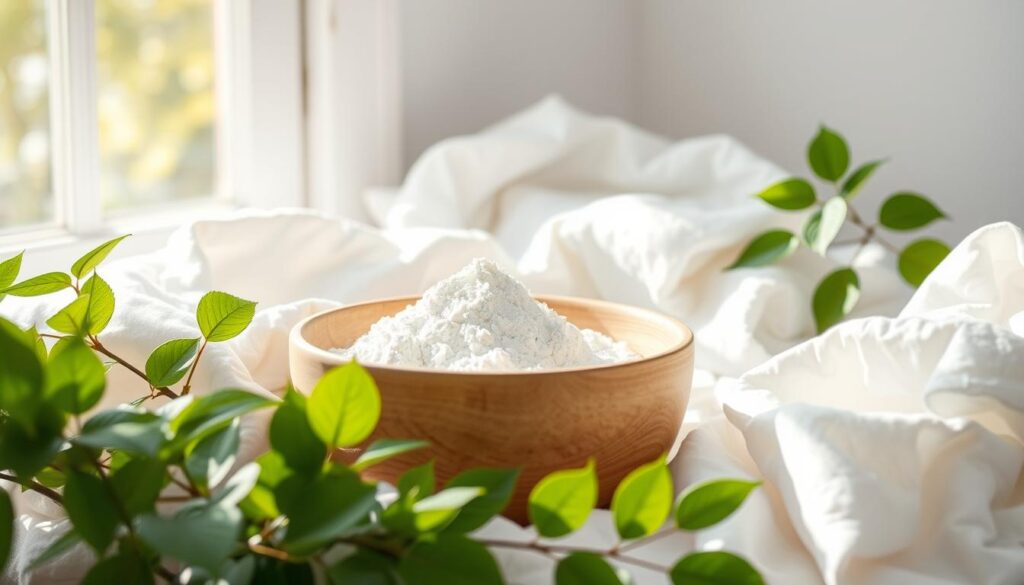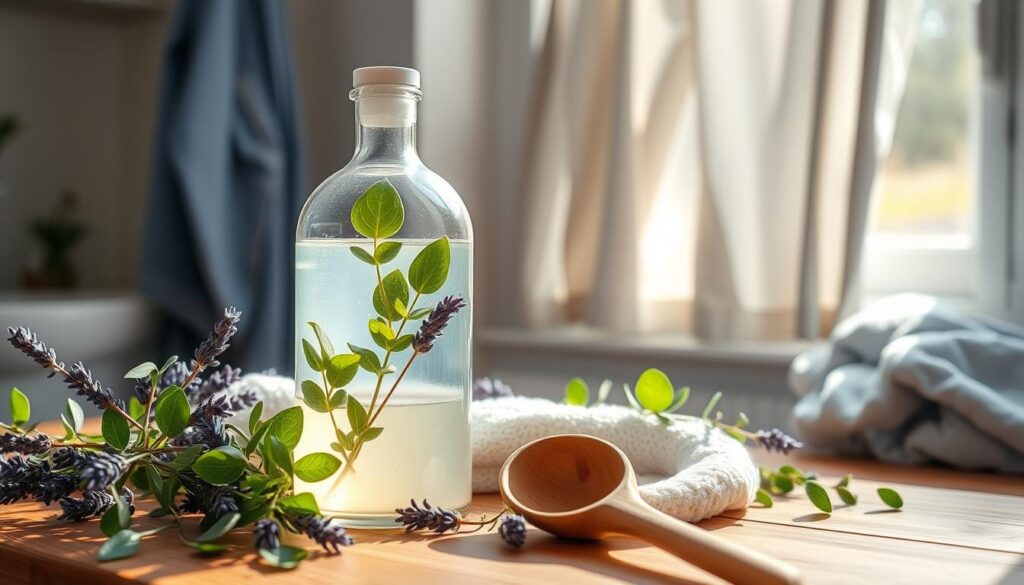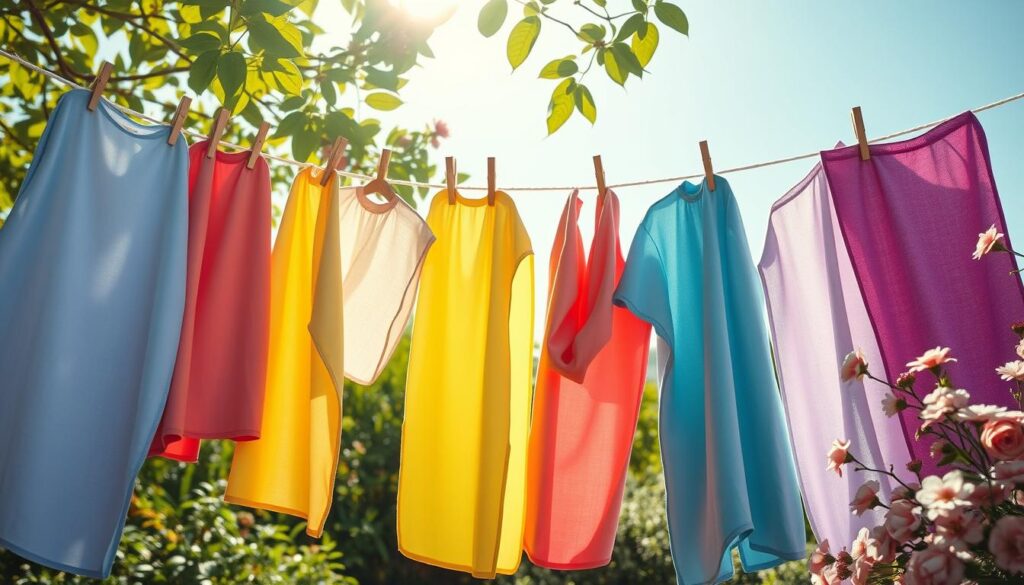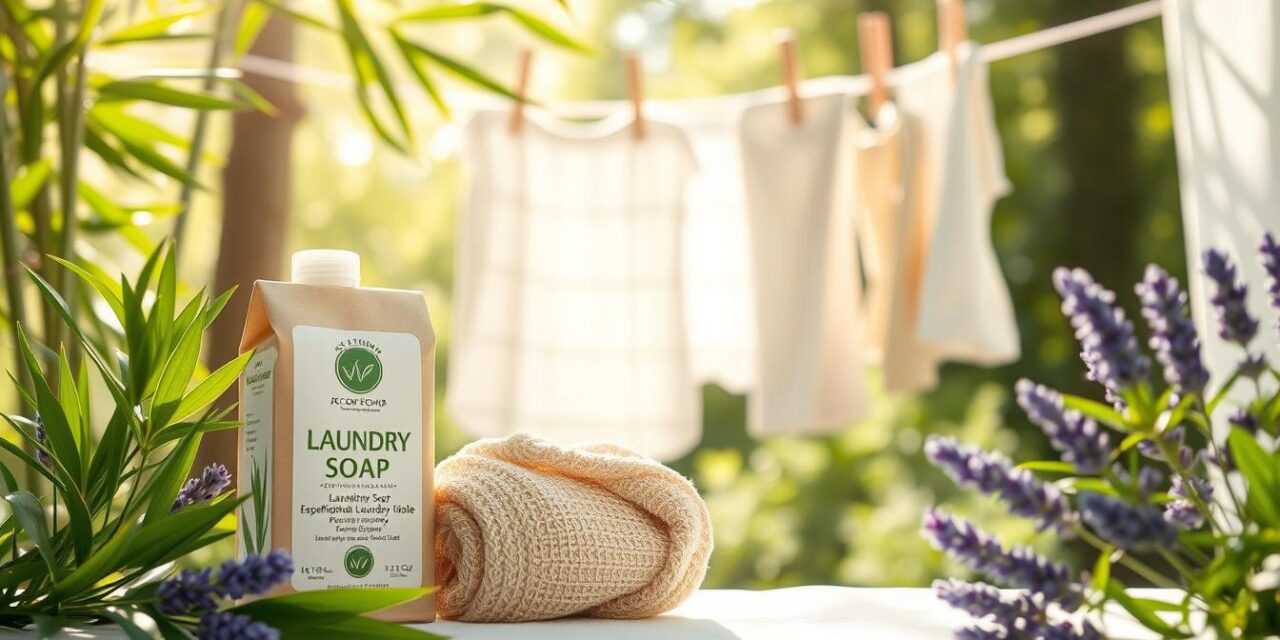Did you know a single load of laundry can release up to 700,000 microplastic fibres into our waterways? This is a shocking fact that shows we need to change how we do laundry. We should use eco-friendly laundry soap and plant-based detergents.
As Australians, we must protect our natural environments. The choice of biodegradable cleaning products is key to this effort.
Key Takeaways
- Conventional laundry detergents contribute to water pollution and harm marine life.
- Natural, plant-based laundry solutions offer a more sustainable and eco-friendly alternative.
- Switching to natural detergents can help reduce your carbon footprint and protect Australian waterways.
- Natural laundry products are designed to be effective while prioritising environmental responsibility.
- Exploring DIY natural laundry options can be a cost-effective and customisable way to clean your clothes sustainably.
Understanding the Environmental Impact of Traditional Detergents
Australians are now more aware of their environmental impact. This awareness has led to a closer look at traditional laundry detergents. These products, once seen as essential for clean clothes, are now questioned for their environmental harm. Let’s delve into the main environmental worries about traditional detergents.
Water Pollution from Conventional Detergents
Traditional laundry detergents contain many synthetic chemicals. These chemicals are not easily broken down. When they go down the drain, they can pollute local waterways, harming aquatic life.
Some detergents have high phosphate levels. This can cause algal blooms, which block oxygen and nutrients from marine life.
Chemical Residue Effects on Marine Life
Chemicals in traditional detergents can stay in the environment. They build up in fish, crustaceans, and other sea creatures. This can be toxic, affecting their health and ability to reproduce.
The long-term effects of these chemicals on marine ecosystems are a big worry for those who care about the environment.
Carbon Footprint of Commercial Laundry Products
| Impact Factor | Conventional Detergents | Natural Detergents |
|---|---|---|
| Energy Consumption | High | Low |
| Greenhouse Gas Emissions | High | Low |
| Packaging Waste | High | Low |
The making, packaging, and sending of traditional detergents add a lot to our carbon footprint. From the energy needed to make them to the plastic packaging, the environmental damage is big. On the other hand, non-toxic laundry solutions and green laundry alternatives are better for the planet.
Australians are working hard to lessen their environmental impact. The need for eco-friendly laundry options is growing. Knowing the harm traditional detergents can cause is the first step to using non-toxic laundry solutions and green laundry alternatives. These choices help protect our waterways and marine life.
What Makes Natural Laundry Detergent Different
More people are thinking about how their daily choices affect the planet. This has led to a rise in demand for chemical-free washing powder and organic laundry detergents. Natural laundry detergents stand out because they are different from regular ones in several ways.
One big difference is in what they’re made of. Regular detergents use synthetic chemicals and harsh additives. On the other hand, environmentally-friendly fabric softeners and natural detergents use plant-based and biodegradable stuff. These are gentler on clothes and the planet, reducing harm to waterways and ecosystems.
| Conventional Detergents | Natural Laundry Detergents |
|---|---|
| Synthetic surfactants, optical brighteners, and fragrances | Plant-based surfactants, essential oils, and natural scents |
| Non-biodegradable components | Biodegradable and sustainable ingredients |
| Heavy reliance on petrochemicals | Derived from renewable, plant-based sources |
The way they’re made is another big difference. Regular detergents need lots of energy and chemicals to make. Natural laundry products, however, are made in ways that are kinder to the planet and more sustainable.
Choosing natural laundry detergents means you get clean, fresh clothes and help the planet at the same time. This move towards eco-friendly laundry shows people want to live in a greener way.

Key Ingredients in Eco-Friendly Laundry Solutions
More people are looking for plant-based cleaners and green cleaning products. They want to know about the ingredients in eco-friendly detergents. These natural options are better for our planet and keep clothes smelling fresh.
Plant-Based Surfactants
Plant-based surfactants are key in eco-friendly laundry. They come from things like coconut and palm oils, not from petroleum. These surfactants clean clothes well without harming the environment.
Essential Oils and Natural Fragrances
Eco-friendly detergents use essential oils for scent. These oils come from plants and smell great. They also help clean and disinfect clothes.
Biodegradable Components
These products focus on biodegradable ingredients. This means they can easily break down naturally. It’s all about reducing harm to our planet, from start to finish.

“By choosing plant-based cleaners and eco-friendly detergents, you can enjoy clean clothes while reducing your environmental footprint.”
Benefits of Switching to Natural Laundry Detergent
More Australians are choosing natural laundry detergents for sustainable living. These products are better for the environment and our health. They offer many benefits beyond just clean clothes.
Natural detergents are kind to the earth. They don’t pollute water or harm marine life like traditional products do. This makes them a greener choice for cleaning.
These detergents are also gentle on clothes. They help your clothes last longer and stay bright. This saves money and supports sustainable fashion.
Lastly, natural detergents are safer for our health. Traditional detergents can irritate skin and cause allergies. Natural options are made with gentle ingredients, making them better for families and people with sensitive skin.
| Benefits of Natural Laundry Detergent | Traditional Laundry Detergent |
|---|---|
| Gentle on the environment | Harsh chemicals and synthetics |
| Preserves fabric quality | Can damage fabrics over time |
| Hypoallergenic and non-irritating | May contain irritants and allergens |
| Sustainable cleaning solution | Contributes to environmental pollution |
Switching to natural laundry detergents is a simple way to help the planet and our health. There are many eco-friendly options available. It’s easier than ever to choose sustainable cleaning solutions.

“Switching to natural laundry detergent is one of the easiest ways for Australians to reduce their environmental footprint and live a more sustainable lifestyle.”
Common Myths About Plant-Based Detergents
More people want eco-friendly laundry options, but myths still exist. Let’s clear up some misconceptions about natural fabric care and botanical laundry washes. We’ll look at the truth behind these plant-based alternatives.
Effectiveness Concerns
Many think natural botanical laundry wash products don’t clean as well as regular ones. But, today’s natural fabric care formulas are made to clean deeply. They use plant-based surfactants and special stain-fighting ingredients. In fact, many natural detergents clean better than traditional ones.
Cost Comparisons
Some believe cruelty-free detergents cost more. While some natural brands might be pricier, there are many affordable botanical laundry wash options. Considering the benefits to the environment and your health, natural laundry care is a good investment.
Cleaning Power Myths
Some think natural fabric care products can’t handle tough stains and smells. But, well-made botanical laundry wash solutions can clean just as well, if not better. It’s all about the right plant-based ingredients for the job.
By clearing up these myths, Australians can choose eco-friendly, cruelty-free detergents confidently. These options offer great results and care for our planet.

How to Choose the Right Eco-Friendly Detergent
Choosing the right eco-friendly laundry soap is key for a sustainable laundry routine. The world of plant-based detergents and biodegradable cleaning products can seem overwhelming. But, with some guidance, you can find the best option for your home.
Understanding your needs is the first step. Think about skin sensitivity, fabric types, and the environment. Reading labels and knowing certifications helps you make a smart choice.
- Choose detergents with plant-based surfactants that are gentle on clothes and the planet.
- Go for formulas with essential oils or natural fragrances instead of synthetic scents.
- Make sure the product is biodegradable and doesn’t harm marine life with harsh chemicals.
Not all eco-friendly laundry soap is the same. Some might focus on performance, while others might be greener but less effective. By researching and knowing your needs, you can find a balance between clean clothes and a clear conscience.
“Choosing the right eco-friendly detergent is not just about clean clothes – it’s about a cleaner, healthier planet.”
With a bit of effort, you can switch to a more eco-friendly laundry routine. By choosing the right plant-based detergents and biodegradable cleaning products, you help the environment. You’re also making a better future for future generations.
DIY Natural Laundry Solutions
Many people are now looking for non-toxic laundry solutions and green laundry alternatives. They are making their own natural laundry remedies. These sustainable fabric care options are good for the planet and save money too.
Soap Nut Recipes
Soap nuts, or soapberries, are a natural choice for laundry. They contain saponins, a natural cleaner. Just put a few in a bag and add it to your wash cycle.
The saponins will clean your clothes gently, without harsh chemicals.
Vinegar and Baking Soda Methods
Vinegar and baking soda are great for laundry. Vinegar softens fabrics and removes stains. Baking soda lifts dirt and odors.
To use, add a cup of vinegar to the rinse cycle. Add half a cup of baking soda to the wash cycle. This makes your clothes clean and safe for the planet.
These green laundry alternatives are cost-effective and eco-friendly. By choosing sustainable fabric care, you can have clean clothes and help the planet.
Best Practices for Sustainable Laundry Care
More Australians are choosing chemical-free washing powder and organic laundry detergents. It’s important to know how to care for your clothes in a sustainable way. A few simple steps can make your environmentally-friendly fabric softeners work better and help the planet.
Wash Full Loads
Washing full loads saves water and energy. Don’t do partial loads as they use more resources.
Opt for Cold Water Washes
Cold water saves energy and keeps your clothes in better shape. Hot water can damage delicate fabrics too soon.
Air Dry Whenever Possible
- Hang clothes on a line or rack to cut down on energy use and make them last longer.
- Tumble drying uses a lot of energy and can harm your clothes over time.
Maintain Your Washing Machine
Keeping your washing machine in good shape saves energy and extends its life. Clean the lint trap, descale, and check seals and gaskets.
“Sustainable laundry care is not only good for the environment, but it can also save you money in the long run.”
By following these tips, you can have clean clothes and help the planet. Small changes can make a big difference in sustainable laundry care.
Australian-Made Natural Laundry Products
In Australia, more people want eco-friendly cleaning options. Local brands are stepping up, making sustainable and ethical products. The market for natural laundry detergent is booming, with many eco-friendly detergent choices available.
Local Eco-Friendly Brands
Brands like Koala Eco, Dirt Detergent, and Lavender & Lime are leading the way. They use plant-based cleaners and biodegradable ingredients. This makes their products safe for clothes and the planet.
- Koala Eco: They make plant-based cleaning solutions in Australia. Their laundry detergents use natural essential oils and no synthetic fragrances.
- Dirt Detergent: This brand combines plant-derived surfactants and essential oils. It’s effective and has a low environmental impact.
- Lavender & Lime: They mix natural ingredients like castile soap and eucalyptus oil. This creates a versatile, eco-friendly detergent line.
Certification Standards
Many Australian brands follow strict certification standards. They have the Australian Certified Organic (ACO) and NASAA Organic certifications. These verify the use of organic, sustainable, and biodegradable ingredients.
| Certification | Description |
|---|---|
| Australian Certified Organic (ACO) | The leading organic certification body in Australia, ensuring strict standards for organic production and processing. |
| NASAA Organic | The National Association for Sustainable Agriculture, Australia, certifies organic, biodynamic, and sustainable farming practices. |
Choosing Australian-made, plant-based cleaners with these certifications is wise. It shows you care about the environment and society.
Temperature Settings and Natural Detergents
Using biodegradable detergents and sustainable cleaning solutions means paying attention to water temperature. Unlike regular laundry products, natural, non-toxic soaps work best in cooler water.
Here are some tips for the best water temperature:
- For lightly soiled, delicate fabrics like silk or wool, use cold water. This helps keep the fibers intact and prevents shrinkage.
- For average soil levels and common clothing items, lukewarm water (around 30-40°C) is best. It activates the cleaning power of plant-based surfactants in natural detergents.
- For heavily soiled loads or stubborn stains, slightly warmer water (up to 50°C) can help. It dissolves the biodegradable components and lifts grime more effectively.
Remember, using hotter water with natural, biodegradable detergents is not needed. It can even reduce their cleaning power. The gentle, non-toxic laundry soap formulas are made to work best in cooler settings. This helps the environment while still cleaning your clothes effectively.
| Fabric Type | Recommended Water Temperature |
|---|---|
| Delicates (Silk, Wool) | Cold Water |
| Average Soiled Clothing | Lukewarm (30-40°C) |
| Heavily Soiled Loads | Warm (up to 50°C) |
By matching your water temperature to the needs of natural, biodegradable detergents, you get the best cleaning. You also reduce the environmental impact of your laundry routine.
Storage and Shelf Life of Natural Detergents
Proper storage and knowing when to use natural detergents are key. Unlike regular detergents, natural ones need special care. This keeps them working well.
Store natural laundry products in a cool, dry spot. Avoid sunlight to prevent damage. Heat, moisture, and UV rays can harm the natural ingredients. This reduces the product’s cleaning power and lifespan.
Keep the containers sealed to protect the formula. This stops it from drying out too fast.
Natural detergents don’t last as long as synthetic ones. They can last from 6 months to 2 years. This is because they don’t have preservatives and use plant-based ingredients. Always check the expiration date and use them before they expire.





